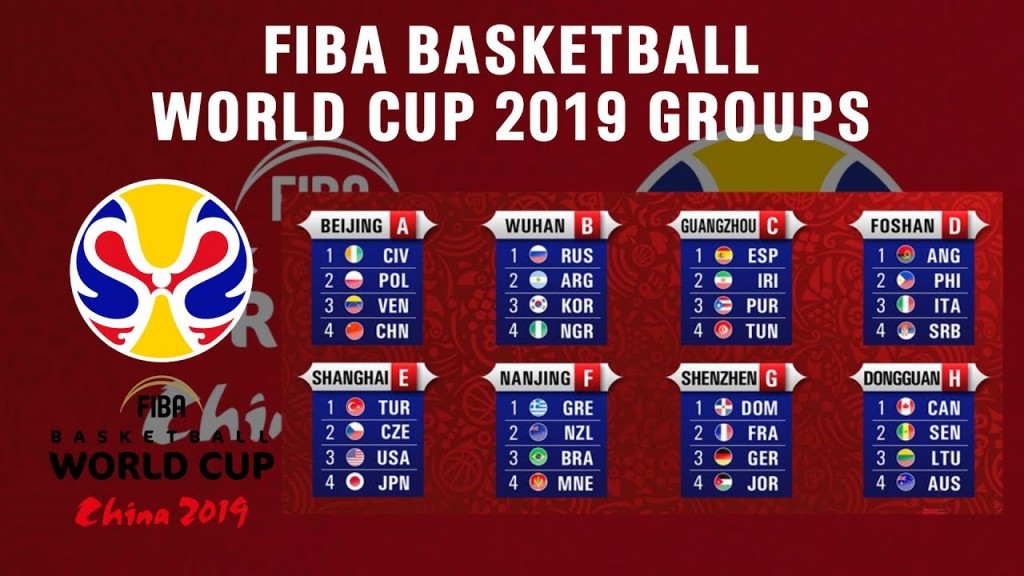
Group H
In the group already dubbed the “Group of Death” by many basketball fans and experts, it seems that the Lithuanian national team will have better chances to advance to the next stage as time goes on. When the groups were first drawn, Lithuania was predicted to finish in 3rd place and be eliminated in the first round. However, due to circumstances where key players from both the Canadian and Australian teams withdrew, Lithuania's chances of advancing have increased, and now the team is even considered a favorite to win the group. There are many possible outcomes in this group, as all teams are competitive and have their strengths, so none of the opponents can be underestimated. In this review, we will analyze each team in the group in more detail.
Lithuania's Chances in Group H
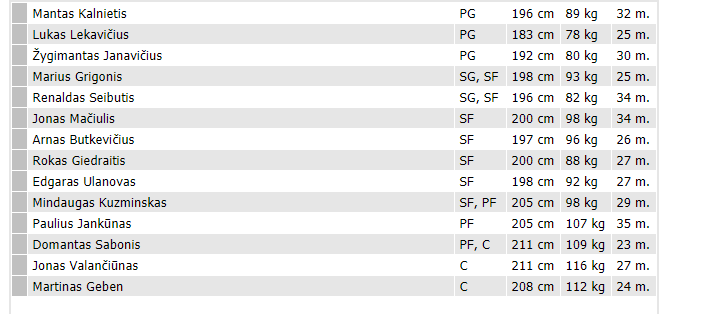
With each game, the Lithuanian national team is showing better form, and so far, their performance leading up to the World Championship is very positive. The final 12-man roster is not yet completely clear, but the core of the team will remain the same as in recent years. The last two players who will not go to the championship are likely to be chosen from M. Geben, A. Butkevičius, and Ž. Janavičius. The choice is difficult, as each has their own strengths, but in the overall context, none of them would have been a key player on whom the team's performance would largely depend.
Potential Team Leaders:
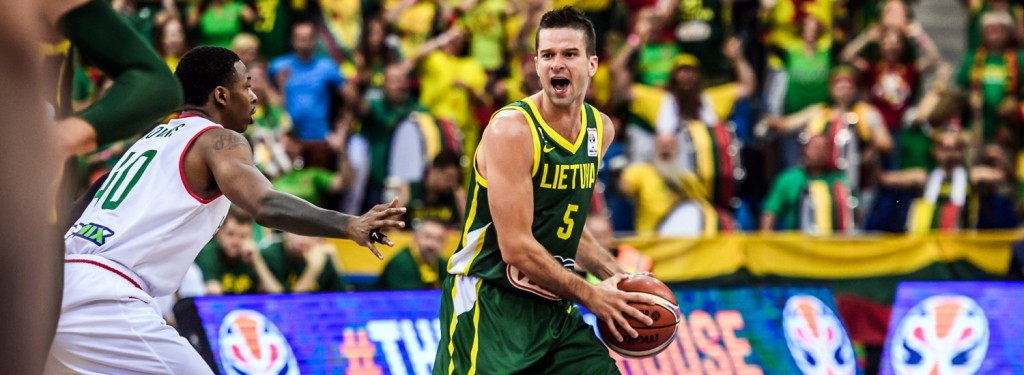
J. Valančiūnas – The Memphis Grizzlies center, who averaged nearly 16 points and 9 rebounds, is considered the main player to lead the team forward, as he is every year. Often criticized for not playing as well for the national team as he does in the NBA, Valančiūnas will aim to prove this summer that he has improved and matured to become the team's leader. Valančiūnas should be one of the most dominant centers in this championship, considering that very few teams have players who can stop him under the basket.
D. Sabonis – The Indiana Pacers forward, who will form a front-line tandem with Valančiūnas, averaged 14 points and 9 rebounds in 74 games this season. Sabonis' improvement was evident in friendly matches, and it is likely that the 23-year-old will be one of the key players in China, around whom the offense will revolve when Valančiūnas is not on the court.
M. Kalnietis – The guard, who averaged 10 points and 6 assists for Lyon Asvel and played in the Eurocup, is always one of the most important players heading into an international championship. Regardless of how the club season goes, the national team captain plays his best basketball when representing the National team. Much of the team's success will depend on how well Kalnietis can create plays with the two big men on the court and create shooting opportunities for himself.
Friendly Matches: The Lithuanian national team is one of the teams that has played the most friendly matches – already 8. Although the first 3 out of 4 matches were tough (losing twice to Serbia and once to Spain), the team managed to win 4 consecutive games by large margins. They defeated Finland 87-46, Russia 88-72, South Korea 86-57, and Angola 91-56. The losses to Serbia should not be overemphasized, as both defeats were by just 4 points, and there were many chances to win at least one of the two meetings. Overall, the team looks very strong, and it is hoped that their performance will reach the best possible level by the start of the championship.
Prediction: The odds for Lithuania to win the group are 2.4, meaning the team is considered the favorite to win Group H. It is likely that the main battle for the group winner's title will be between Lithuania and Australia, and it will depend on which team plays better on the day, as both have different strengths, and much will depend on who can better utilize them. We predict 1st-2nd place for the national team.
Can Australia Meet Expectations?
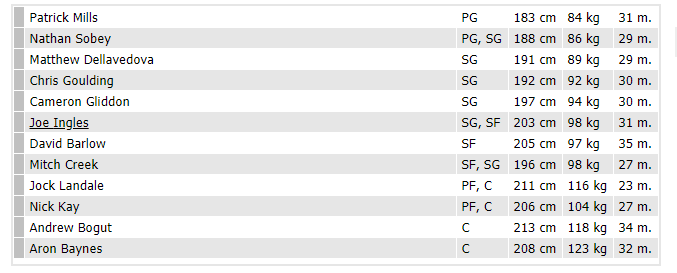
The Australian national team has assembled perhaps the strongest possible roster for the World Basketball Championship. Of course, the losses of players like R. Broekhoff, J. Bolden, D. Exum, T. Maker, and B. Simmons are significant, but there are many teams in this championship with even greater losses, so overall, the Australian team still looks very solid with the current players. It is likely that the main leaders of the Australian team in this championship will be veterans P. Mills, J. Ingles, A. Bogut, M. Dellavedova, and A. Baynes, also including C. Goulding, who shone in the National Basketball League, and J. Landale, a newcomer to the Kaunas Žalgiris team.
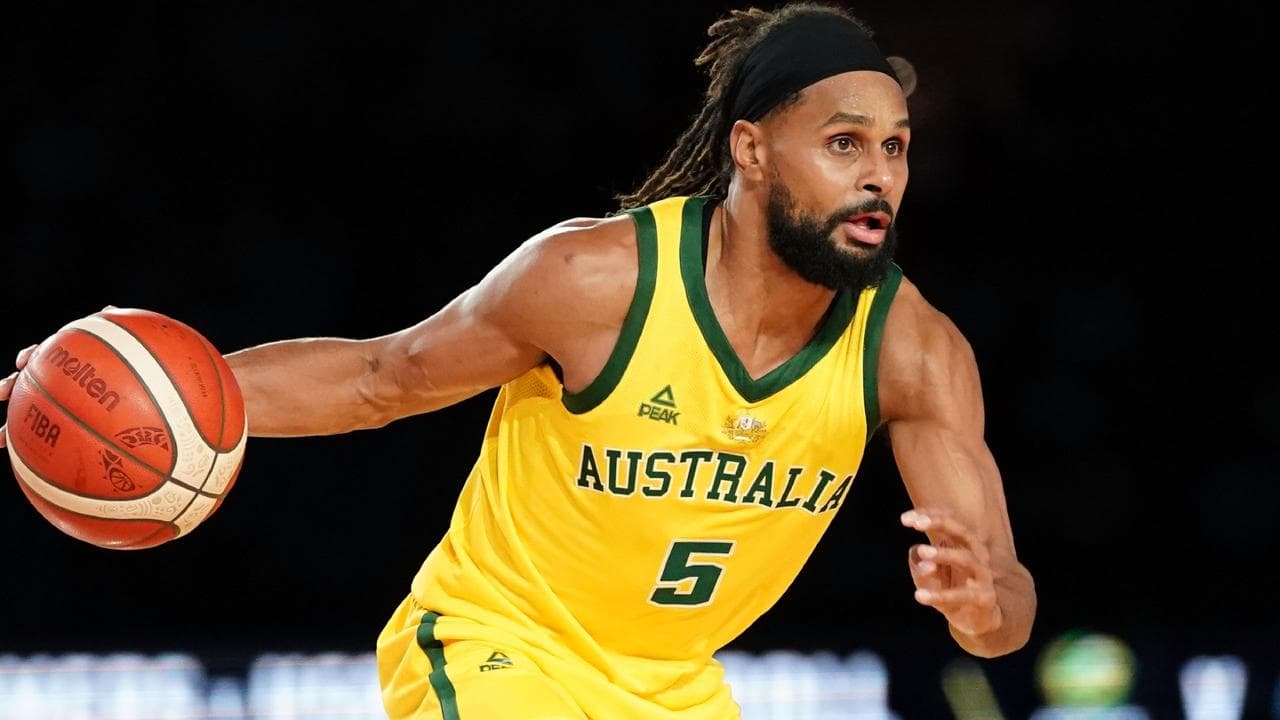
P. Mills – The guard, who averaged 10 points and 3 assists for the San Antonio Spurs, is always one of the most important pieces of the Australian national team puzzle. Excellent at attacking off the dribble, capable of driving himself and playing 2-on-2 with the center, Mills will undoubtedly be one of the hardest players to stop in the championship. This player only needs to hit a couple of shots, and then even double defense might not be enough, as once Mills finds his rhythm, he becomes unstoppable, as he already proved by leading the Australian team to victory over the USA in a recent friendly match.
J. Ingles – The left-handed forward for the Utah Jazz, whose role in the NBA team grows every year, will undoubtedly be an important part of the Australian national team. With excellent court vision and perfect passing, the 31-year-old forward will be the second playmaker for the team after P. Mills. High hopes are placed on this accurate long-range shooter who can create his own shot, as the team aims for the highest results.
A. Bogut – Although this veteran's career is nearing its end with each passing season, one cannot help but admire his ability to read the game, set great screens, and his leadership qualities. Although injuries have plagued him in recent seasons, and he is no longer in the form he once was, he has proven in this preparation cycle that he can still successfully finish plays, dribble the ball across the court, and be useful on both ends of the floor.
Friendly Matches: The Australian national team has already played four friendly matches in preparation for the championship. In the first control match, they lost to Canada 70-90, but just two days later, they avenged that loss with an 81-73 victory. The Australians also played two matches against the USA team: losing the first match 86-102, but winning the second 98-94. P. Mills, who scored 13 of the team's 20 points in the 4th quarter, along with J. Ingles, led the team to victory, ending the USA team's long-standing dominance in international competitions.
Prediction: Although the Australians lost once to Canada, part of that can be attributed to the fact that it was the first control match for this team, and many rookie mistakes were made that will not be repeated in the championship. Not advancing to the next stage would be considered a complete disaster for a country that has assembled such a strong team, so it is likely that the team competing with Lithuania for the top spot will finish 1st-2nd in the group and move on to the next stage.
Can Canada Defy the Predictions?

The Canadian national team is undoubtedly one of the most “depleted” teams participating in this World Championship. Potentially having up to 17 NBA players, the final roster includes only one NBA player. A. Wiggins (Timberwolves), K. Olynyk (Heat), J. Murray (Nuggets), D. Powell (Mavericks), D. Brooks (Grizzlies), T. Lyles (Spurs), S.
Gilgeous-Alexander (Clippers) – these and many other basketball players refused to help the Canadian team in this championship, and these are huge losses considering how well some of these young players have integrated into their respective teams and how important they have become. Despite the losses, Canada had a competitive team that competed in the World Championship qualifiers, and most of that team will represent the national team in China. The Canadian team should be led by:
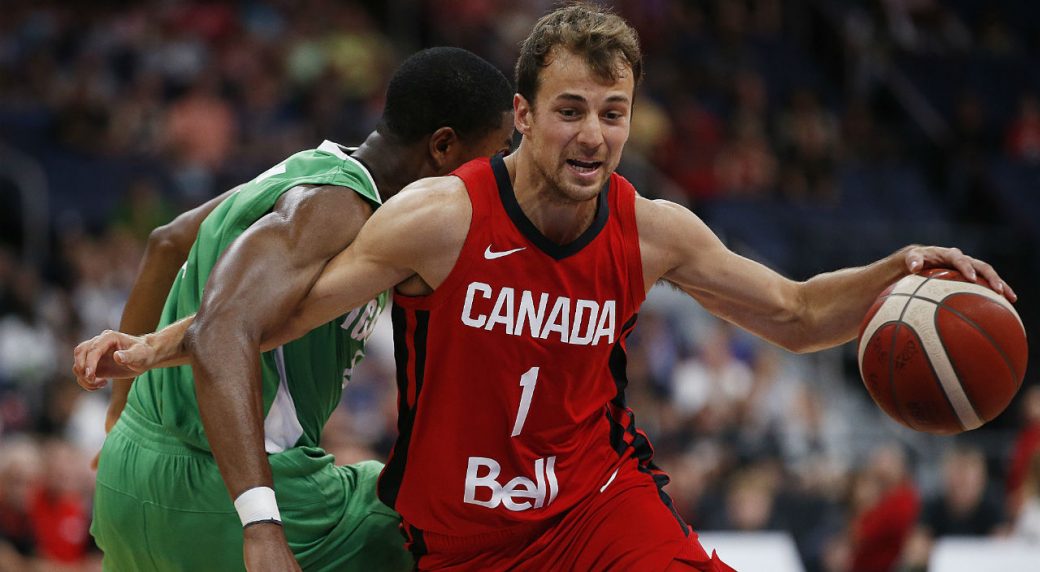
K. Pangos – a player well known to all Lithuanian basketball fans, who moved to the Barcelona team this season, is undoubtedly expected to be one of the key players for the Canadian national team in the upcoming World Basketball Championship. A guard who can create his own opportunities, play 2-on-2, and has a precise shot, he has already proven in friendly matches that he is ready to be the team's leader. The only thing Pangos noticeably lacked during the preparation stages was taking more initiative. In the match against New Zealand, with just a few seconds left and the score tied, he decided to pass instead of taking a shot from a great position, which ended in a missed shot. Pangos should take responsibility for the final shots to at least advance to the next stage.
K. Wiltjer – averaging 10 points and 3 rebounds for the Malaga Unicaja team, the forward will be one of the cornerstone players for the national team in the World Championship. A player who attacks well from a distance and can stretch the court will undoubtedly be an important part of the team. In friendly matches, it was often seen that the Canadian team tries to find offensive solutions in the first few seconds, and some of those shots often fall to K. Wiltjer, who gets just a bit of space. Undoubtedly, N. Nurse will find ways to create opportunities for this player to shine, and all success will depend on Wiltjer's ability to capitalize on those situations.
K. Birch – the only remaining NBA representative on the team, who averaged just 5 points and 4 rebounds in 13 minutes of play for the Orlando Magic. Although Birch is not a player who can shoot from a distance, he will add strength under the basket, which the team would undoubtedly lack without him. Birch can also play 2-on-2 well, finish attacks, and battle under the basket, so he will undoubtedly be an important part of the team's success in the upcoming championship.
Friendly matches: The Canadian team has already played 6 control matches, winning 4 of them. The Canadians, who won the first control match cycle game against Nigeria with a score of 96-87, could not achieve the same result in the second meeting of these teams held two days later: they had to acknowledge Nigeria's superiority with a score of 81-90. The Canadians also split victories with the Australian national team: winning the first meeting 90-70, the Canadian team lost the second one with a score of 73-81. The last two matches were played against the New Zealand team, and both times the Canadian basketball players celebrated victories: 122-88 and 103-100.
Prediction: The Canadian team ended up in probably the most unfavorable group, as in any other group, the chances of advancing to the next stage would be much higher. Both the Lithuanian and Australian teams looked much more confident not only in control matches but also on paper as more solid teams. NBA champion coach N. Nurse would have to surprise significantly to lead this Canadian team to the next stage, but it is quite unlikely. The Canadian team is expected to end its performance in this championship in the group stage.
What are Senegal's chances to surprise in Group H?
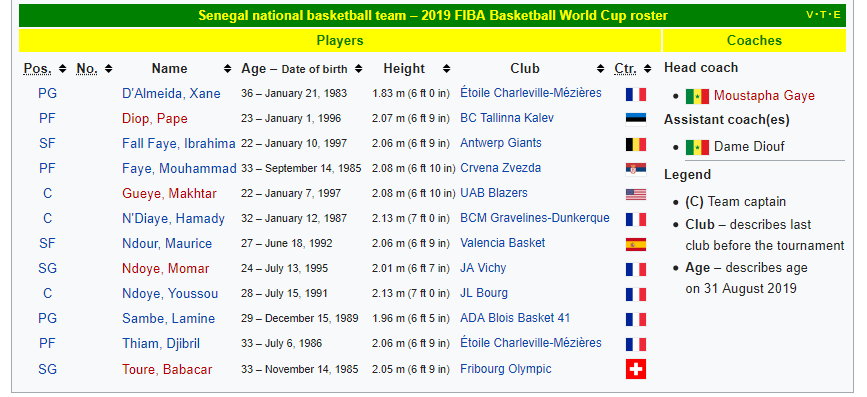
The Senegal team, which is the last opponent of the Lithuanian national team in the group stage, has already announced the final 12 players representing the country in the World Basketball Championship. The final Senegal team stands out for its height – there will be only 2 players shorter than 2 meters, and the average height of the team reaches 203 cm. The team also has no shortage of veterans, with an average age of 29 years. Although not all members of the Senegal team are familiar to the average basketball fan, some of them play in strong French and Euroleague clubs. Maurice Ndour (Valencia) and Mouhammad Faye (Crvena Zvezda), who will play in the Euroleague next season, should be the pillars of the team in this championship. The Senegal team also has losses – two NBA big men, G. Dieng and T. Fall, who would have further strengthened the already powerful front line, will not help the team.
https://www.youtube.com/watch?v=pLRNPHfeoQA
Friendly matches: The Senegal team did not shine in control matches – out of 6 games played, they achieved only 1 victory. They lost 54-117 to the Italian team in the first control match, then defeated the Venezuelan team 75-69, followed by 4 consecutive losses: 56-73 to Russia, 59-94 to Turkey, 63-71 to Jordan, and 74-81 to Venezuela. Considering that the opponents of the Senegal team in control matches were far from the strongest, and only 1 victory was achieved – the outlook is not positive.
Prediction: The Senegal team is undoubtedly the underdog of Group H, with their chances of advancing to the next stage rated at more than 100+ odds. The team, which performed poorly in friendly matches, is unlikely to miraculously improve its game when the championship begins and surprise all the team's critics. The main strength of the team will be the battle under the basket, but considering how strong the front lines of both the Lithuanian and Australian teams will be, this advantage is unlikely to save Senegal in matches against these teams. Senegal should finish in 4th place and end its performance in this championship in the group stage.





